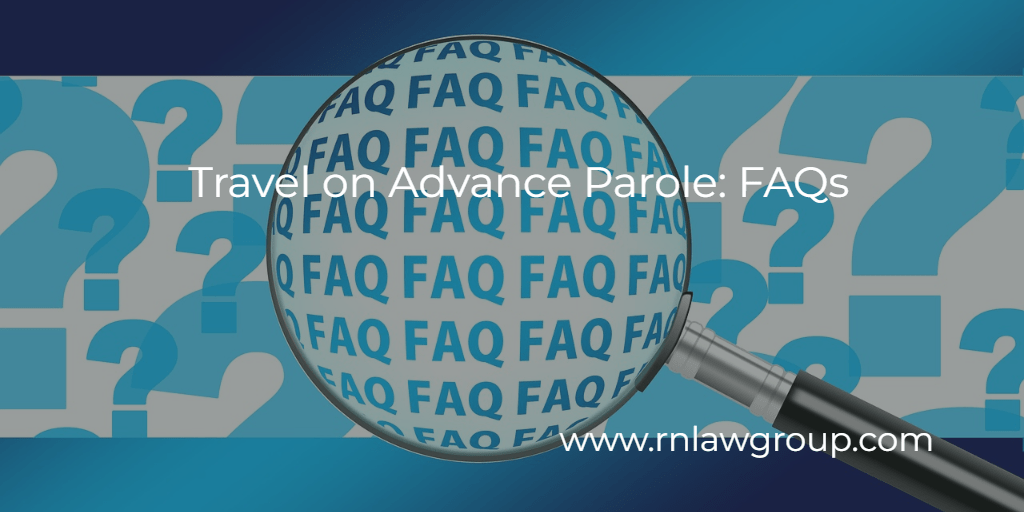
Travel on Advance Parole: FAQs
Applicants for adjustment of status with a pending I-485 application are eligible to receive an Advance Parole travel document, which enables them to travel internationally without the need of an underlying visa while they wait for their green card to be approved. If you have received Advance Parole on the basis of a pending adjustment of status application, you may be considering the following:
Is the Advance Parole supposed to be issued as a combination card with the EAD if I apply for both at the same time?
Historically, if the I-765 and I-131 applications for the EAD and Advance Parole were filed concurrently, USCIS would approve both applications at the same time and issue an EAD/AP “combo card” that could be used for both work authorization and travel. This combo card looks identical to an EAD card, but printed at the bottom of the card is the phrase “SERVES AS I-512 ADVANCE PAROLE.”
However, in the past year, it has been common for USCIS to approve the I-765 application first, and the I-131 several months later, even if the applications were filed simultaneously (this appears to be a response to the pressure to improve EAD processing times). When the 2 applications are approved separately, the EAD card is issued without the “I-512” endorsement printed at the bottom. The Advance Parole, when approved on its own, would be issued in the form of a full-page document called the I-512L, printed on heavy paper (similar to an original I-797 approval notice) with the applicant’s photograph at the bottom. When the applications are approved separately, it is important that the applicant not use the standalone EAD card for international travel – it will not be accepted by CBP without the “SERVES AS I-512” endorsement. Instead, if the full-page original I-512L document should be used as the travel document.
When I enter the U.S. using Advance Parole, my electronic I-94 record lists a one-year validity period. Do I need to extend the I-94 prior to that end-date?
No. Unlike the I-94 for nonimmigrant status, which needs to be extended before the end-date, the I-94 that you are issued when entering on Advance Parole does not need to be extended. The “DA” class of admission indicates that you are an adjustment of status applicant, and you are in a period of authorized stay as long as the I-485 application remains pending. The one-year duration listed on the I-94 is standard, and no action needs to be taken prior to that end-date.
When I enter the U.S. using Advance Parole, what is my status? If I have an unexpired approval notice for nonimmigrant status, such as H-1B or H-4 with EAD, can I be considered in that status and work based on it?
This is a bit of a grey area. As mentioned above, upon entering the United States using your Advance Parole, you are considered an adjustment of status applicant, and your most recent I-94 indicates that. However, USCIS has stated that those who entered the U.S. on Advance Parole can have their valid, unexpired H or L status extended through an extension of status application filed with USCIS. Adjustment of status applicants may therefore reactivate their nonimmigrant status via an extension of status application, without the need of travel out of the U.S. Travel to Mexico or Canada could also be a quick way to reactivate prior nonimmigrant status in the absence of a valid visa stamp, through automatic revalidation. It is recommended to discuss with a business immigration attorney about your work authorization options when returning to the U.S. using Advance Parole, if you cannot or don’t intend to use an adjustment-based EAD.
How can I expedite processing of a pending I-131 application?
The options to expedite a pending application for Advance Parole are unfortunately quite limited. At this time, there is no premium processing option for the I-131 application, and USCIS typically reserves expedited processing requests for extremely urgent or unusual situations. If there is an emergency or humanitarian need for travel, assistance may also be requested from the applicant’s Congressional representative’s office. For long-pending cases, federal court litigation may also be an option.
If I am granted emergency Advance Parole, how long is it valid for?
Advance Parole that is granted in response to an approved expedite request will usually only be valid for the amount of time it takes to attend the emergency situation. Rather than the typical 2-year validity period, an emergency Advance Parole may only be valid for 1 month or several weeks.
If I travel while my I-131 application is pending, will it be denied?
Yes, USCIS policy currently states that departing the U.S. while an Advance Parole application is pending can result in abandonment and denial of the I-131 application. Applicants who travel while their I-131 application is pending therefore must be prepared to return using their nonimmigrant status, including applying for a visa stamp from a U.S. consulate while abroad, if necessary.
Upon returning to the U.S., the I-131 application can be re-filed, even if the first application remains pending and has not yet been denied. A denied I-131 application will not have an adverse effect on the overall adjustment of status application, or the ability to apply for Advance Parole again.
If my pending I-131 was approved while I was outside the U.S., can I use it to return to the U.S.?
No. Despite USCIS’s policy of denying I-131 applications when the applicant departs the U.S., there are a small percentage that are approved while the applicant is outside the United States. If that is the case, USCIS can still later consider the Advance Parole issued in error, and the entry based on it invalid.
What documents do I need to carry when entering the U.S. using Advance Parole?
You should carry the original valid Advance Parole document (either the EAD/AP combo card, or the original I-512L document) and a copy of your I-485 receipt notice, in addition to your passport.
Will my entry at the border take longer if I am using Advance Parole?
There is a possibility that your entry at the border may take slightly longer when presenting the Advance Parole as your entry document. Some CBP officers routinely ask Advance Parole applicants to wait in secondary inspection at the port of entry, so that the basis of the Advance Parole (the pending I-485 application) can be verified. This is standard at some ports of entry and is not cause for alarm. If asked, the traveler should simply state that their Advance Parole is based on their pending I-485 adjustment of status application.
We are committed to assisting our clients with navigating the often lengthy green card process and other challenging immigration matters as an accomplished business immigration law firm in Houston, Texas. Feel free to contact us or set up a consultation to discuss your specific situation related to your travel plans, and how they may affect your pending applications and work authorization.
By: Rebecca Chen
Rebecca Chen is a Partner at Reddy & Neumann. Her representation includes advising clients throughout the non-immigrant and immigrant visa application process, from initial filing, responding to various requests for evidence, and processing at overseas consulates. Her years of experience in the immigration field have made her a knowledgeable resource for complex business immigration matters.

